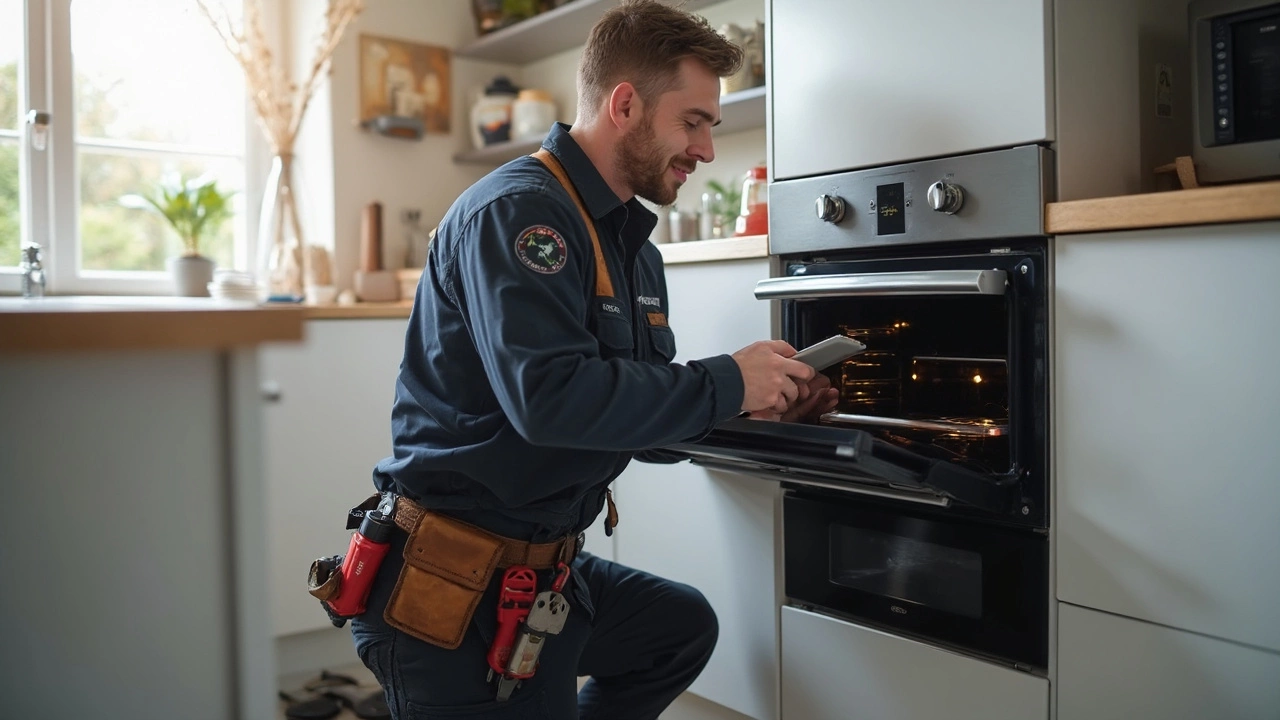
- 4 May 2025
- Gideon Thornton
- 0
Ever had your oven just stop working right before a big dinner? Happens more than you’d think, and suddenly you’re scrambling to Google what kind of person can even help. So, here’s the lowdown: the official job title for someone who fixes ovens is “appliance repair technician,” but honestly, most people just call them oven repair technicians or oven mechanics.
If you see a van with 'appliance repair' on the side, odds are, they handle ovens along with fridges, dishwashers, and a bunch of other stuff. The trick is, not every appliance tech has the right experience with ovens, especially gas models. Some specialize, so always ask before booking someone and check if they’ve worked on your brand or problem before. It can save you a huge headache (and money) down the road.
- What’s the Official Name?
- Everyday Problems and Quick Fixes
- When to Call a Pro
- How to Choose the Right Oven Technician
What’s the Official Name?
If you’re scrolling through job listings or calling up a repair shop, you’ll probably see the term appliance repair technician. This is the umbrella title for folks who work on home appliances—fridges, washers, stoves, and, obviously, ovens. If you want someone who mainly fixes ovens, they’re more often called oven repair technicians or sometimes oven mechanics. All these terms point to someone who knows their way around heating elements, thermostats, and control panels.
The appliance repair trade covers both electrical and gas ovens. Some technicians get certified through groups like the International Society of Certified Electronics Technicians (ISCET) or have training from manufacturers like Whirlpool or GE. While there’s no special “oven-only” license, a good oven technician will have experience with the most common brands—think GE, Samsung, LG, Whirlpool, Bosch.
Here’s what these techs usually handle:
- Diagnosing oven problems (like no heat, uneven baking, or weird smells)
- Fixing or replacing the heating elements, igniters, or control boards
- Adjusting doors, sealing gaskets, and fixing temperature sensors
- Making sure everything is safe, especially with gas connections
If you hear someone call themselves a "white goods engineer" (more common in the UK), they’re talking about the same job. But in the US and Canada, if you search for an oven repair pro, use keywords like “oven repair technician” or “appliance repair.”
One stat that stands out: according to a 2023 Appliance Repair Association survey, about 68% of appliance repair calls for kitchen gear are actually for ovens and ranges. That means these techs get plenty of practice—so make sure you get someone with the right job title to fix your heat issues fast.
Everyday Problems and Quick Fixes
When it comes to broken ovens, a handful of issues pop up over and over. If your oven is acting up, it’s probably one of these common problems. Sometimes, you can fix things yourself if you know what to look for, but other times, calling an oven repair technician is the smarter move.
- Oven won’t heat up: This is a classic. For electric ovens, the culprit might be a blown bake element or a dodgy thermostat. Gas ovens? Sometimes the igniter fails. Tip: Check your circuit breaker or the gas connection before panicking.
- Uneven cooking: A lot of times, this means the heating element or fan isn’t working right. If cookies are scorched on one side and raw on the other, it’s a sign something’s off inside.
- Oven door won’t close properly: Loose hinges or worn-out gaskets can let out heat, meaning your food takes longer to cook or never really cooks all the way through.
- Strange noises or smells: Clicking sounds from a gas oven often mean trouble with the igniter, while odd smells can be leftover food bits burning or, rarely, an electrical short in the wiring.
Before you call in an appliance repair technician, here are a few quick fixes that actually work for a surprising number of folks:
- Give the oven a quick unplug and reboot. It works for computers—and sometimes appliances, too.
- For electric ovens, a blown fuse can be cheap and easy to swap out. Just make sure you unplug first and check your oven’s manual for the proper fuse rating.
- If the oven light won’t work, try a basic bulb change before going deeper.
- Clean out any visible food debris, especially around the door seal and the bottom. A blocked fan or seal can cause big headaches.
Take a look at this quick snapshot of common oven problems and their DIY success rates:
| Problem | DIY Fix Success Rate | When to Call a Pro |
|---|---|---|
| Oven not heating | ~30% | Element/igniter replacement |
| Uneven cooking | ~40% | Blown fan or sensor issue |
| Door not closing | ~50% | Damaged hinges/frame |
If you’ve checked these basics and the oven still acts up, don’t keep guessing. A solid oven service call saves time, cuts risks, and makes sure you don’t accidentally turn a minor problem into a kitchen nightmare.

When to Call a Pro
Sometimes it’s tempting to look up a quick fix on YouTube and grab a screwdriver. But when it comes to oven repair, playing around can actually make things worse or even be dangerous. So, when should you drop the tools and ring up an oven technician?
- No heat or uneven heating: If your oven won’t get hot, takes forever to warm up, or cooks in weird hot spots, you’re likely dealing with a bad heating element, burnt-out igniter, or busted thermostat. These aren’t usually DIY jobs since they involve electrical parts and sometimes shifting around heavy components.
- Gas smell or issues starting: Smelling gas or having trouble getting a gas oven to ignite is a huge red flag. A pro has the right tools to safely check for leaks and replace faulty igniters or valves.
- Broken door or control panel: A door that won’t close or a panel that flashes random codes can point to broken springs, seals, or electronic faults. Messing with these without proper know-how can lead to more problems.
- Unusual noises or sparks: Any weird humming, clicking, or sparking is a sign something inside is off, like loose wires or fans. Ignore it and you risk further damage or even fire.
- Repeated fuse trips: If your oven causes your home’s fuses or breakers to trip, don’t keep flipping them back. You may have a short or unsafe wiring inside the oven itself—definitely a job for a qualified appliance repair technician.
An expert oven mechanic will bring specialized tools—like voltage testers and gas leak detectors—that most folks don’t have lying around. According to a recent survey by HomeAdvisor, about 60% of oven repairs were too technical for the average homeowner. Trying to ‘wing it’ usually leads to more expensive service calls later. So if you spot any of these problems, it’s best to get help before the issue gets worse (or more expensive to fix).
How to Choose the Right Oven Technician
Picking the right oven repair technician can be the difference between a quick fix and a saga of useless appointments. Start by checking if the technician is actually certified to work on ovens—especially if you’ve got a gas model. Most pros are certified by organizations like the EPA or have manufacturer training for brands like Whirlpool, GE, or Samsung. If you don’t see any proof of that on their website or tool bag, ask them directly. No shame in protecting your wallet.
Next, look at reviews, but not just the stars. Read a few details. A technician who’s on time, explains things clearly, and actually fixes the problem? That’s gold. If you see too many complaints about being late or messing up other appliances, move on and keep searching. You want someone reliable, not just local.
Price matters, but cheapest isn’t always best. Good appliance repair comes from experience, not just a low hourly rate. Most experts will give you a rough quote on the phone after you describe the issue. If someone’s cagey or won’t even ballpark it, that’s a red flag. And always ask if there’s a service call fee—some techs fold that into the total cost, others tack it on no matter what.
Here’s a quick checklist to make things easier:
- Check certification for oven repair and insurance coverage.
- Read reviews on Google, Yelp, or a neighborhood forum for honest feedback.
- Ask about experience with your specific oven brand and model.
- Get a written estimate before any work starts.
- See if they use genuine replacement parts, especially for newer ovens.
According to the North American Association of Appliance Repair Technicians, "Technicians certified by appliance manufacturers resolve issues up to 40% faster than general handymen." That means less downtime (and fewer frozen pizza nights).
"A well-trained oven technician not only fixes the problem but helps extend the lifespan of your appliance. Always look for current certifications and up-to-date training."
– Appliance Technician Journal, April 2024
Don’t forget to ask about warranties, too. Reputable oven service techs usually guarantee their work—if something goes wrong a week later, you’ll want backup. The extra effort up front saves money and stress in the long run.




